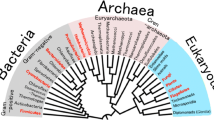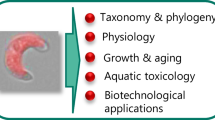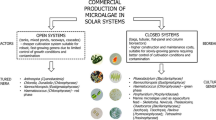Abstract
Representatives of five genera of psychroactive oligotrophic bacteria, Arcocella, Renobacter, Spirosoma, Caulobacter, and Methylobacterium, were for the first time shown to be capable of growing at a negative temperature (−2°C). Long-term cultivation (for 116 days) at a low temperature under limitation by the carbon source is stressful for oligotrophic bacteria and leads to the death of a part of the cell population. The number of viable cells of Caulobacter crescentus decreased by two to three orders of magnitude. Over the studied period of time, Renobacter vacuolatum cells retained viability at a low temperature, whereas, at room temperature, the titer of colony-forming cells decreased by two orders of magnitude under starvation stress.
Similar content being viewed by others
REFERENCES
O.I. Slabova (1988) ArticleTitleResistance of Oligotrophs to Stress Factors Mikrobiologiya 57 IssueID4 697–699
O.I. Slabova M.S. Oranskaya D.I. Nikitin (1993) ArticleTitleGrowth of Oligotrophs at Low Temperature Mikrobiologiya 62 IssueID6 1072–1078
D.I. Nikitin O.I. Slabova I.A. Pitryuk V.V. Sorokin M.S. Oranskaya (1998) ArticleTitleResponse of Psychroactive Oligotrophic Bacteria with an Unusual Lipid Composition to Cultivation Temperatures Mikrobiologiya 67 IssueID1 65–72
M. Bhakao R.A. Herbert (1980) ArticleTitleFatty Acid and Phospholipid Composition of Five Psychrotrophic Pseudomonas spp. Grown at Different Temperatures Arch. Microbiol. 126 51–55
P. Morgan C.S. Dow (1986) NoChapterTitle R.A. Herbert G.A. Good (Eds) Microbes in Extreme Environments Academic London 201–210
Y. Suwa T. Hattory (1986) ArticleTitleCellular Fatty Acids and Quinone Systems of Oligotrophic Soil Bacteria J. Gen. Appl. Microbiol. 32 451–471
P. Hirsch B. Conti (1964) ArticleTitleBiology of Budding Bacteria. 1. Enrichment, Isolation, and Morphology of Hyphomicrobium sp. Arch. Microbiol. 48 339
D.I. Nikitin O.I. Slabova E.D. Zagreba (1990) ArticleTitleThe Use of Poly-β-Hydroxybutyric Acid in the Process of Oxidation of Gaseous Substrates and Their Mixtures by Cells of Methylobacterium organophilum Mikrobiologiya 59 IssueID6 938–941
V.V. Sakharovskii D.I. Nikitin V.G. Sakharovskii (1999) ArticleTitlePhysiological Peculiarities of the Survival of Some Gram-Negative Bacteria under conditions of Carbon Starvation Prikl. Biokhim. Mikrobiol. 35 IssueID4 422–431
Author information
Authors and Affiliations
Additional information
Translated from Mikrobiologiya, Vol. 73, No. 6, 2004, pp. 758–762.
Original Russian Text Copyright © 2004 by Slabova, Nikitin.
Rights and permissions
About this article
Cite this article
Slabova, O.I., Nikitin, D.I. Influence of the incubation temperature on the reaction of oligotrophic bacteria to stress. Microbiology 73, 650–653 (2004). https://doi.org/10.1007/s11021-005-0005-z
Received:
Issue Date:
DOI: https://doi.org/10.1007/s11021-005-0005-z




